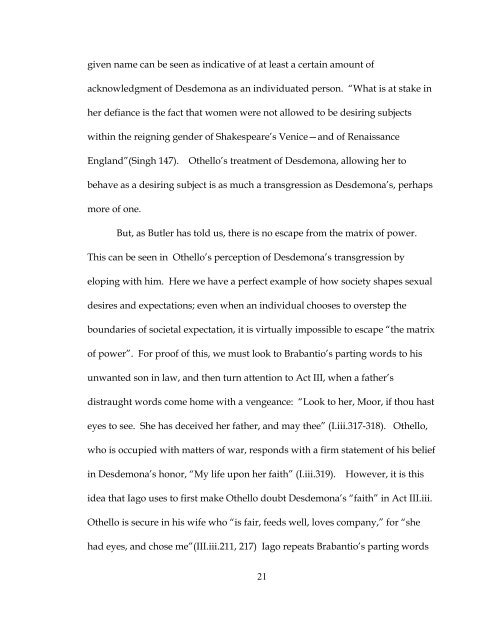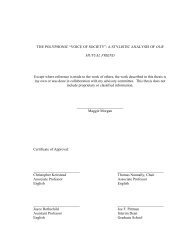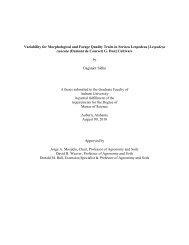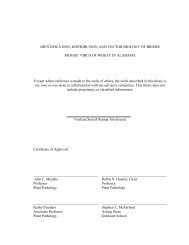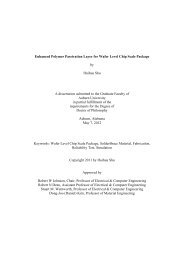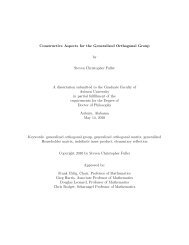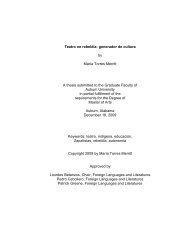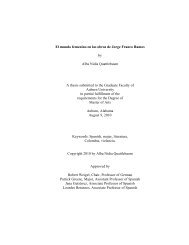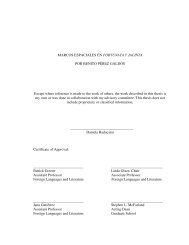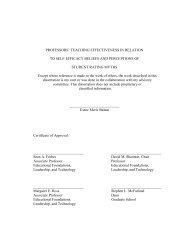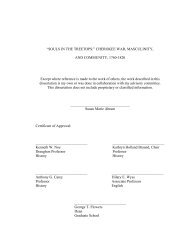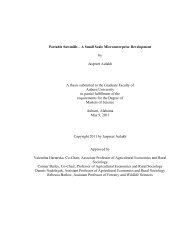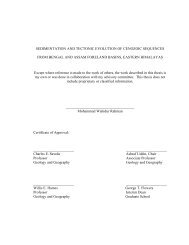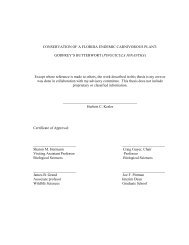the trouble with gender in othello - Auburn University Electronic ...
the trouble with gender in othello - Auburn University Electronic ...
the trouble with gender in othello - Auburn University Electronic ...
You also want an ePaper? Increase the reach of your titles
YUMPU automatically turns print PDFs into web optimized ePapers that Google loves.
given name can be seen as <strong>in</strong>dicative of at least a certa<strong>in</strong> amount of<br />
acknowledgment of Desdemona as an <strong>in</strong>dividuated person. “What is at stake <strong>in</strong><br />
her defiance is <strong>the</strong> fact that women were not allowed to be desir<strong>in</strong>g subjects<br />
<strong>with</strong><strong>in</strong> <strong>the</strong> reign<strong>in</strong>g <strong>gender</strong> of Shakespeare’s Venice—and of Renaissance<br />
England”(S<strong>in</strong>gh 147). O<strong>the</strong>llo’s treatment of Desdemona, allow<strong>in</strong>g her to<br />
behave as a desir<strong>in</strong>g subject is as much a transgression as Desdemona’s, perhaps<br />
more of one.<br />
But, as Butler has told us, <strong>the</strong>re is no escape from <strong>the</strong> matrix of power.<br />
This can be seen <strong>in</strong> O<strong>the</strong>llo’s perception of Desdemona’s transgression by<br />
elop<strong>in</strong>g <strong>with</strong> him. Here we have a perfect example of how society shapes sexual<br />
desires and expectations; even when an <strong>in</strong>dividual chooses to overstep <strong>the</strong><br />
boundaries of societal expectation, it is virtually impossible to escape “<strong>the</strong> matrix<br />
of power”. For proof of this, we must look to Brabantio’s part<strong>in</strong>g words to his<br />
unwanted son <strong>in</strong> law, and <strong>the</strong>n turn attention to Act III, when a fa<strong>the</strong>r’s<br />
distraught words come home <strong>with</strong> a vengeance: “Look to her, Moor, if thou hast<br />
eyes to see. She has deceived her fa<strong>the</strong>r, and may <strong>the</strong>e” (I.iii.317-318). O<strong>the</strong>llo,<br />
who is occupied <strong>with</strong> matters of war, responds <strong>with</strong> a firm statement of his belief<br />
<strong>in</strong> Desdemona’s honor, “My life upon her faith” (I.iii.319). However, it is this<br />
idea that Iago uses to first make O<strong>the</strong>llo doubt Desdemona’s “faith” <strong>in</strong> Act III.iii.<br />
O<strong>the</strong>llo is secure <strong>in</strong> his wife who “is fair, feeds well, loves company,” for “she<br />
had eyes, and chose me”(III.iii.211, 217) Iago repeats Brabantio’s part<strong>in</strong>g words<br />
21


